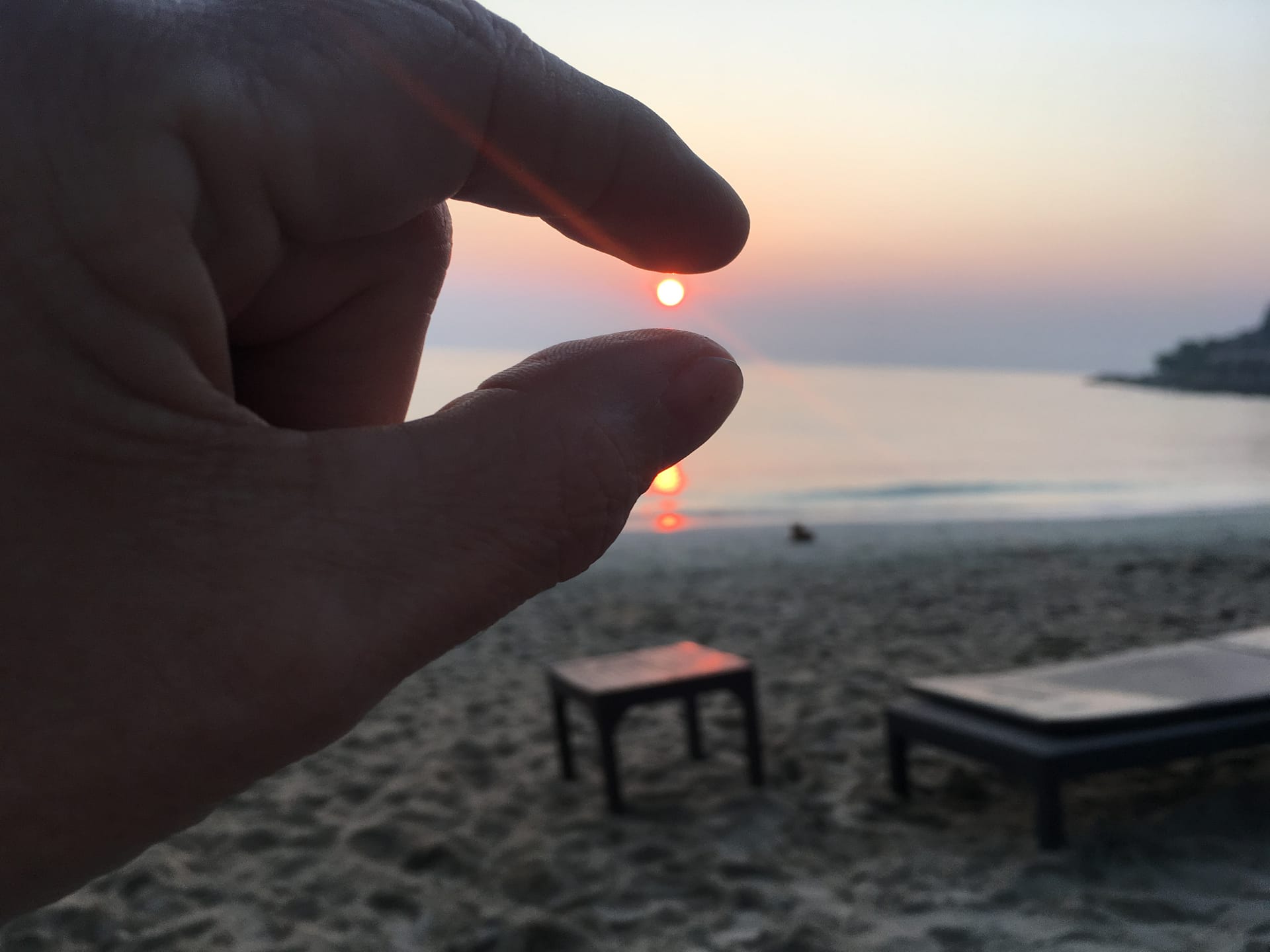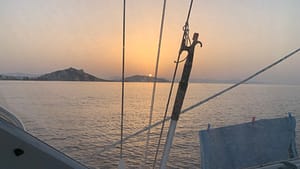After a few weeks at home in Denmark we went to Asia. Dubai was the first stop. A while before landing we could see the skyline. It is one of the largest in the world. The airport is huge. In fact, only Atlanta in the United States and Beijing in China are bigger and more busy in terms of passenger traffic. We did not get far into the airport before we stopped at a checkpoint. A X-Ray of our hand luggage. Was this lack of confidence in the security in Copenhagen ? a customs clearance? or both ? We did not find out and soon arrived at the passport control. The queue was short and we quickly reached a counter with a young Arab man dressed in a white arabic robe and a white and red scarf. He looked calmly at our passports and asked us politely to look into a couple of cameras. Shortly after we were registered as entered.
In 1966 rich oil reserves were discovered in Dubai. In a few years, the emirate became one of the richest countries in the world. Oil today accounts for less than 5 percent of Dubai's income. This is due to diminishing reserves, but also an increase in income from tourism, IT, media and finance. There are many attractions. Burj Al Khalifa, with its 828 meter, the world's tallest building. Dubai Mall, visited by over 50 million people a year, the world's largest shopping center or mall, as it is called outside Europe. Great hotels with Burl Al Arab - the world's only 7 star hotel - as the most luxurious. Amusement parks with lights, music and screaming visitors . Ski and skating facilities. Wide well kept beaches to the Persian Gulf. Market places with spices, clothes and silver and gold merchandise . A wealth of supply of tours into the desert and cruises in the Persian Gulf.
Good infrastructure and low duties and taxes have provided and still provide good conditions for the IT, media and finance industries.
The atmosphere was friendly and welcoming. English was spoken everywhere. There were tourists from Europe, Russia, China, India, Australia, the United States, and also from Saudi Arabia, where it is popular with trips of shorter duration to Dubai.
"You can walk everywhere at all times of the day. It is completely safe here, "said the young polite Pakistani taxi driver while he zigzagged us through the busy traffic on the wide six-track highway," but you never know who is watching you, "he added while threw another look at us in mirror.
After 4 days we went on to Hong Kong.
We were received by Daniel and Emilie. They were on their annual trip to Hong Kong to celebrate the Chinese New Year with Emilie's family.
After a few days, Niklas and Olivia and little Augusta also came. They had started their maternity adventure and were on their way to Bali with the first stop in Hong Kong.
Now it was Daniel and Emilie's turn to show off and share previous impressions and experiences with us.
"Hong Kong is like New York on speed," Daniel explained.
The population is 7,4 million. That is 1,5 million more than in Denmark, which with a similar density would have 300 million inhabitants. It is not possible to build houses in the mountainous areas. This is why less than 25% of the area is inhabited. The most densly populated area is Mong Kok. The density is 5 times higher than in Monaco, which is the most densely populated country in the world.
The skyline is enormous. Over 300 buildings are above 150 meters high. That is 6 times more than in the EU and almost 50% more than in New York, considered to have the world's second largest skyline.
Hong Kongs new history is closely related to Europe.
When Europeans reached China, they brought silk, tea and porcelain home to Europe. There was not much they could bring the opposite way. As consumption of especially tea rose, the trade deficit began to reduce the stock of silver. But Europeans were entrepreneurs and found a product the Chinese could use - Opium. It was forbidden to extract opium in China and Great Britain. In colonized India, it was not illegal and the conditions for cultivation were good.The British East India Company, a Government owned company, began to cultivate and extract opium which they sold to merchants who smuggled it to China and sold it to the Chinese. Other countries Germany, France, Portugal and the United States participated in the lucrative export adventure. More and more Chinese became addicted to smoking opium. Consumption increased. So did the Europeans' income. They now gained a surplus on the trade. To stop the smuggling, the Qing Dynasty tried to appeal to British morals and asked the King to stop the cultivation of opium. In vain. The dynasty forbade all trade with Europe and destroyed the opium stocks in the Canton. This began the first opium war. The Chinese army, weakened by the abuse of opium, lost the war. The price of the defeat was that China had to reopen trade with Europe and concede Hong Kong Island to the British forever. Later, the British expanded its possession with the New Territories area. This time through a lease agreement with a 99 years duration.
"As good as eternity" as the British governor expressed it when the agreement was signed in 1898.
During World War II Hong Kong was occupied by the Japanese.
After the war, the British got their colony back. In 1949 China adopted communism after a revolution.In a few years, the population was almost quadrupled by Chinese people on the run from communism. Many had had their own business in China. They continued being self employed and contributed to creating Hong Kong's "tiger economy", based on light industry, textile industry and financial industry.
In the middle of the 80 when China launched the open-door policy, many Chinese again fled to Hong Kong. This time the emigrants provided the colony with cheap labor.
Growth after World War II exceded the growth in Britain by far
According to Nobel laureate Hong Kong, economist Milton Friedman was "a shining example of how well an unregulated capitalist economy works."
In 1997, eternity ceased and the British left Hong Kong.
It was part of the agreement that China will secure Hong Kong's independence until 2047. Confidence in the slogan "one country two systems" being adhered to was not great. Nearly 0,5 million chose to emigrate to countries such as the United States, Canada and Australia. Later, the population increased, partly as a result of emigration from China.
The main language is Cantonese. English is spoken almost everywhere and many children are still given an English and Chinese first name.
All religions are represented, but like in China, the majority of the population is what Westerners call atheists.
Everything can be bought. 24 hours a day, 7 days a week. Stores of jewelery and watches for double-digit millions amount side by side with street markets and cheap restaurants. There are long queues of Chinese (Mainlanders) from China in front of the European branded stores. They are locked in groups of 20 to 30. No time is wasted here to ooze. You know what you want and buy it. After 15 to 20 minutes, they are shut out with elegant bags in their hands. On Sundays, the many maids from Indonesia and the Philippines have their weekly day off. They fill the streets of the financial district, playing cards, eating, talking, laughing out loud, singing and dancing in droves.
The supply of restaurants is huge. All kinds of food is available at almost all times of the day.
Michelin-starred restaurants that at an affordable price only have dumplings on the menu. Restaurants with a wretched exterior. So lousy that as a tourist with care for your stomach you will most likely not go in. It is a shame. The food is well prepared and made from fresh and delicious ingredients in simple and hygienic surroundings. Automated restaurants, where you order your dish with a click of an iPad, get it served and settle without the participation of a single person in the real world. Restaurants on top of the tall buildings overlooking the skyline with wines for over 1 million kroner and coffee and tea at prices like in Denmark.
With Daniel and Emilie as knowledgeable guides, we were given new experiences every day. Met for the first time Emilie's family. Visited the Volvo Ocean race village and saw the 65 foot sailing boats racing with the big skyline as a backdrop. Drove with the 5,7 kilometer long cable car that led us to the big Buddha at staggering heights. During the 25 minute trip, we watched the 55 km long newly constructed bridge connecting Hong Kong with Macao and Zuhai in China. Went to the Peak and Stanley, where house prices clearly demonstrate the great inequality of income and wealth. Went to the horse races where westerners from the financial district were in the majority. Took a day trip to China and visited the city of Shenzhen. Until 1979, the city lived of fishing and had a population of 30.000. Today it is the headquarters of high tech companies and has 12,5 million residents. It is here Foxcon produces iPhones, iPad and Amazon Kindle at a factory that employs 0,5 million employees and which the irony of history has given the nickname the forbidden factory.
We also met Grace and Eunice, whom we learned to know during their visit to Denmark. Through them, we got a little impression of everyday life for young people in Hong Kong. On the surface it looks like everyday life in Denmark. But you do not have to go a lot deeper before you sense decisive differences.
After a couple of weeks there was a break up. Niklas and Olivia and Augusta traveled on to Bali. Daniel and Emilie went back to Europe and we traveled on to Thailand.
Here we breathed a sigh of relief, enjoyed the heat and digested the many impressions of the last 1,5 years.
At the beginning of March we went back to a deep-frozen Danish spring, determined to sell our house in Humlebæk.


Hi Carl and Pia
Always exciting to read your stories, it's a bit like being there yourself, but without all that packing, flying, driving and sailing - is that one on the experience?
However, the last line was a bit sad because I thought it was nice to be down there at the end of the road. Hope for you that you get a good sale and we still have to hear about your "quests" in the world.
Crush Anette
Nice post and nice winter that you had, traveling to many different places! How are things in Menton? Has Heron been repaired? Cheers, Sarah & Thijs
That I must say ?? you get to see and experience a lot of exciting things, are at home at the moment and need to go out sailing again. Really good Sunday and hope you have a good time? it looks like it. The most sincere greetings from Juddi